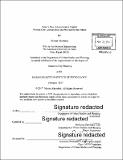Cairo's new administrative capital Wedian City : lessons from the past and for the future
Author(s)
Khorshed, Mirette
DownloadFull printable version (14.43Mb)
Other Contributors
Massachusetts Institute of Technology. Department of Urban Studies and Planning.
Advisor
Lawrence Vale.
Terms of use
Metadata
Show full item recordAbstract
The Egyptian government's announcement in 2015 of its plans to construct a New Administrative capital, to be known as Wedian City, is the latest example in a recurrent pattern of announced administrative relocations and satellite cities being constructed on the outskirts of Cairo. Previous relocations and new cities, planned to be self-sufficient and independent have only been partially successful, and in most cases remain reliant on the city or have now merged into the original city. As plans move forward towards the development of the new Administrative Capital - this thesis examines the socio-economic, political and historical context in which this project has been announced and the urban context in which it is being implemented. Furthermore, it hopes to critically assess some of the advantages and disadvantages of the development based on the initial released documents. Also, it attempts to draw conclusions and lessons from this proposal and the experience of other cities that may guide future phases of the project and aid in the assessment of possible future initiatives both locally and internationally. The announcement and current move forward with the proposal for Wedian City is an opportunity to analyze a wide cross-section of topics pertaining to national, city planning challenges of both old and new cities in Egypt. Due to the scale and nature through which the project was placed into implementation, the proposal touches on various urban design topics and elements at various scales and levels. Upon a closer look at the proposal the project poses concerns if not addressed. Furthermore, since urban design is in many ways a tangible representation of current planning processes, and a physical transformation of the current state of affairs, conditions and priorities, the urban design of the new proposal will be given special attention within the context of the greater urban planning context. In order to promote improved urban design outcome, based on previous experience, this thesis concludes and recommends additional considerations with regard to long-terms sustainability measures, more accurate outcome-oriented socio-economic accounting, and the integrated development of land-uses and urban components. The thesis uses the five principles of Good City Form proposed by Kevin Lynch throughout the process to improve key elements of vitality, sense, fit, access and control.
Description
Thesis: M.C.P., Massachusetts Institute of Technology, Department of Urban Studies and Planning, 2017. Cataloged from PDF version of thesis. Includes bibliographical references (pages 118-122).
Date issued
2017Department
Massachusetts Institute of Technology. Department of Urban Studies and PlanningPublisher
Massachusetts Institute of Technology
Keywords
Urban Studies and Planning.